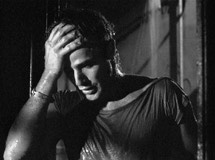 A STREETCAR NAMED DESIRE (1951)
A STREETCAR NAMED DESIRE (1951)
****/**** Image A Sound A Extras A+
starring Vivien Leigh, Marlon Brando, Kim Hunter, Karl Malden
screenplay by Tennessee Williams, based on his play
directed by Elia Kazan
BABY DOLL (1956)
****/**** Image B Sound A Extras B+
starring Karl Malden, Carroll Baker, Eli Wallach, Mildred Dunnock
screenplay by Tennessee Williams
directed by Elia Kazan
 CAT ON A HOT TIN ROOF (1958)
CAT ON A HOT TIN ROOF (1958)
****/**** Image A Sound A Extras C
starring Elizabeth Taylor, Paul Newman, Burl Ives, Jack Carson
screenplay by Richard Brooks and James Poe, based on the play by Tennessee Williams
directed by Richard Brooks
THE ROMAN SPRING OF MRS. STONE (1961)
*/**** Image A Sound A Extras C
starring Vivien Leigh, Warren Beatty, Lotte Lenya, Jill St. John
screenplay by Gavin Lambert, based on the novel by Tennessee Williams
directed by José Quintero
SWEET BIRD OF YOUTH (1962)
***/**** Image B- Sound A- Extras A
starring Paul Newman, Geraldine Page, Shirley Knight, Ed Begley
screenplay by Richard Brooks, based on the play by Tennessee Williams
directed by Richard Brooks
THE NIGHT OF THE IGUANA (1964)
****/**** Image B- Sound B- Extras A
starring Richard Burton, Ava Gardner, Deborah Kerr, Sue Lyon
screenplay by Anthony Veiller and John Huston, based on the play by Tennessee Williams
directed by John Huston
TENNESSEE WILLIAMS’ SOUTH (1973)
**½*/**** Image C Sound D
directed by Harry Rasky
 by Walter Chaw Marlon Brando is liquid sex in A Streetcar Named Desire, molten and mercurial. He’s said that he modeled his Stanley Kowalski after a gorilla, and the manner in which Stanley eats, wrist bent at an almost fey angle, picking at fruit and leftovers in the sweltering heat of Elia Kazan’s flophouse New Orleans, you can really see the primate in him. (Imagine a gorilla smelling a flower.) Brando’s Stanley is cunning, too: he sees through the careful artifice of his sister-in-law Blanche (Vivien Leigh, Old Hollywood), and every second he’s on screen, everything else wilts in the face of him. It’s said that Tennessee Williams used to buy front-row seats to his plays and then laugh like a loon at his rural atrocities; he’s something like the Shakespeare of sexual politics, the poet laureate of repression, and in his eyes, he’s only ever written comedies. In Kazan’s and Brando’s too, I’d hazard, as A Streetcar Named Desire elicits volumes of delighted laughter. The way that Stanley’s “acquaintances” are lined up in his mind to appraise the contents of Blanche’s suitcase. The way he invokes “Napoleonic Law” with beady-eyed fervour. And the way, finally, that he’s right about Blanche and all her hysterical machinations. The moment Stanley introduces himself to Blanche is of the shivers-causing variety (like the moment John Ford zooms up to John Wayne in Stagecoach), but my favourite parts of the film–aside from his torn-shirt “STELLA!”–are when Stanley screeches like a cat, and when he threatens violence on the jabbering Blanche by screaming, “Hey, why don’t you cut the re-bop!”
by Walter Chaw Marlon Brando is liquid sex in A Streetcar Named Desire, molten and mercurial. He’s said that he modeled his Stanley Kowalski after a gorilla, and the manner in which Stanley eats, wrist bent at an almost fey angle, picking at fruit and leftovers in the sweltering heat of Elia Kazan’s flophouse New Orleans, you can really see the primate in him. (Imagine a gorilla smelling a flower.) Brando’s Stanley is cunning, too: he sees through the careful artifice of his sister-in-law Blanche (Vivien Leigh, Old Hollywood), and every second he’s on screen, everything else wilts in the face of him. It’s said that Tennessee Williams used to buy front-row seats to his plays and then laugh like a loon at his rural atrocities; he’s something like the Shakespeare of sexual politics, the poet laureate of repression, and in his eyes, he’s only ever written comedies. In Kazan’s and Brando’s too, I’d hazard, as A Streetcar Named Desire elicits volumes of delighted laughter. The way that Stanley’s “acquaintances” are lined up in his mind to appraise the contents of Blanche’s suitcase. The way he invokes “Napoleonic Law” with beady-eyed fervour. And the way, finally, that he’s right about Blanche and all her hysterical machinations. The moment Stanley introduces himself to Blanche is of the shivers-causing variety (like the moment John Ford zooms up to John Wayne in Stagecoach), but my favourite parts of the film–aside from his torn-shirt “STELLA!”–are when Stanley screeches like a cat, and when he threatens violence on the jabbering Blanche by screaming, “Hey, why don’t you cut the re-bop!”

 A STREETCAR NAMED DESIRE (1951)
A STREETCAR NAMED DESIRE (1951) by Bill Chambers
by Bill Chambers